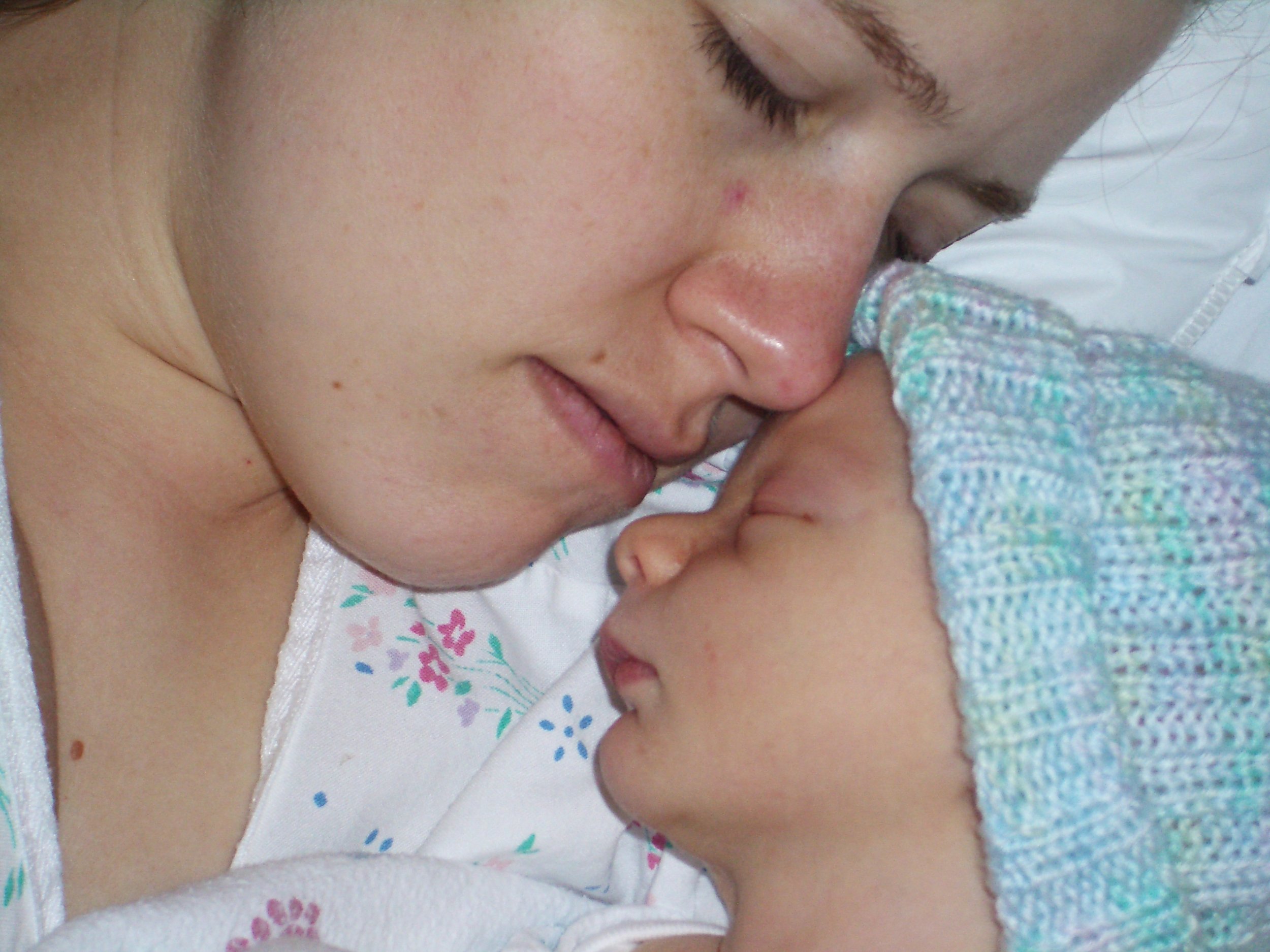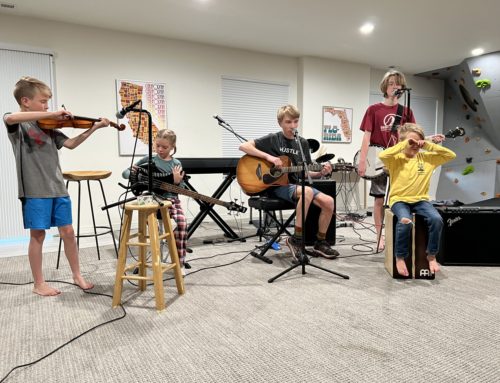I found out I was going to be a mom in a very dramatic way. I was 25 years old. My eggs had been retrieved, fertilized, frozen, and implanted in our first round of in-vitro fertilization. Then we got the call to let us know that it was unsuccessful. We were sad, but after four years of monthly disappointments, we knew how to play this game. We put our Pollyanna faces on—at least we still had 11 embryos left–I took a brief reprieve from the awful progesterone shots that are as thick as peanut butter, and we started preparing for the next round.
Then, a week later, I got another call at work. After all the complicated testing we had been through, they had misread the most simple, most common one—the pregnancy test. I was pregnant after all! They needed me to come in immediately for a progesterone shot.
Sobbing uncontrollably, I called my husband, who thought at first that someone must have died. I pulled myself together enough to share the news, then hung up and ran out of the office, still crying. I shouted over my shoulder to the receptionist, “I’m leaving for the day,” and then I ran to the hospital. Since it was February in Rochester, MN, this involved running like a tear-stained rodent through the underground tunnels that connect everything downtown, so you don’t have to go outside when it’s 20 below. I scurried to the clinic, got my shot, and finally had time to process what was happening. I was going to be a mom!
It’s been about two years since I started How She Moms, and I realized I haven’t really shared the origin story. So I thought I’d start from the beginning and tell about my motherhood journey and what How She Moms is all about.
Once upon a time, I was a young magazine editor who really wanted to be a mom. And it just wasn’t happening. Unexplained, inexplicable, infuriating infertility. Then, finally, as I shared in the intro, I was pregnant. Despite the awful progesterone shots, which I took daily until after the first trimester, the pregnancy went just like my daily email updates said it should be going. I tracked his growth from lima bean to brussels sprout to bell pepper. I delighted when I first felt him flutter. I laughed when he got the hiccups. I loved watching my belly protrude further and further, rippling with his movements.
The birth itself had some scary moments, but we both came through it and David and I finally held our much-anticipated little Jonas in our arms. We were ecstatic. So this was motherhood.
Fast forward four years. I now had two little boys and another boy on the way, the second two, thankfully, without IVF. This time I was well acquainted with motherhood. In fact, I was drowning in it. My house was a mess; I was just getting over morning sickness; I hadn’t had a good night’s sleep in years. This was not exactly what I had envisioned as I was injecting progesterone those many years ago. We were in survival mode. I didn’t want to just survive. I wanted to thrive.
Knowing what I know now, after five kids and 13 years of motherhood, I understand that survival mode is just part of the cycle. Sometimes surviving is winning. But at that point, of course, motherhood itself seemed like the embodiment of Thoreau’s famous phrase—quiet desperation.
After my first son was born, I had gradually tapered off my job at the magazine, first editing just a quarterly magazine from home, then editing a monthly column and writing a few articles now and then. By this time, I had stopped writing for the magazine altogether. I was a full-time mom, but I realized I was treating it like a job, not a career.
I had waited so long for this, and I wanted to be good at this career I had chosen.
Sidenote here: Whether you have another career as well, or whether motherhood is your sole career, it is a career—one that you keep, in different forms, for the rest of your life. But it’s a career without much formal training. You can’t get an official bachelor’s degree in motherhood, let alone a master’s or PhD.
I realized that I if I wanted to get better at this motherhood/household management career, I needed to create my own curriculum.
I also needed a title. And so, my career as the CEO of Archibald Inc. officially began. I opened my laptop and created a new file called, of course, Archibald Inc. I then created folders for each department of our small corporation: Finance, Culinary Arts, Janitorial, Education, Recreation Management, Facilities Management, HR, Administration, etc.
Another sidenote here: I know that not all of these departments are motherhood related. Managing a household and being a mom are not the same thing. But in my case, I am the household manager as well as the mom, and I’m guessing that most of you at least share household management responsibilities as well as being a mom. Since How She Moms and Manages Her Household does not have the same ring to it as How She Moms, I’ve rolled it all into one.
I knew I couldn’t tackle all the departments at once, so each month, decided which department was struggling the most. Then took some time to figure out my objectives for that department. For example, under janitorial, my main objective was to put housekeeping on autopilot so I could be quick and efficient and have more time to spend on things I actually enjoyed. For Education, I wanted to teach my kids to be excited and curious about learning new things.
Once I set my objectives, I would start creating systems that would help me meet those objectives.
To help me create these systems, I did my research. Each month I checked out books related to the topic and talked to everyone I knew about how they handled that department in their own home.
My best resources were other moms who had already solved a lot of the problems I was facing. In any given household people come up with brilliant ideas every day, just solving the problems of everyday living and parenting. Usually those great ideas become invisible as they become routine, and we don’t think about sharing them with each other.
Often, as I washed my dishes or folded laundry, I imagined what I’d see if I could lift off the roofs of houses all over my neighborhood and get a bird’s-eye view. I’d see families doing mostly the same things—standing at an open fridge wondering what to make for dinner, messing up the house and cleaning it back up again, reading bedtime stories—but in different ways.
When I was an editor and needed new ideas, I just called a meeting of my editorial advisory board. So I started holding board meetings of my own, inviting other moms to playdates or lunches specifically so we could talk shop—so I could sneak a peek into how they solved problems.
The first month, I focused on the janitorial department—specifically keeping my kitchen clean. I set a specific goal—a clean kitchen before bed each night. I found several books and blogs with information about efficient ways to clean a kitchen, and I streamlined my process. Because I prioritized it, I was able to actually do it, and even though it may seem trivial to those of you who have always been able to do this, it was so empowering!
Once that month was over, I picked a new department to prioritize. One month I focused on education and took my little guys on a field trip to the library or zoo or museum each week. Another month, I focused on basic car maintenance, to get ready for an upcoming road trip. I also included personal development—an important part of being a mom. I once spent a whole month trying not to be such a know-it-all—a problem I’ve struggled with since my over-eager hand-raising days in elementary school. I was totally that kid. During know-it-all month, I would coach myself before entering conversations to use the phrases “What a great idea,” “I’ve never thought of that,” and “I didn’t know that,” among other tactics.
Eventually, this monthly program became a way of life. Sure I missed some months when I was pregnant or had a baby and I would go into survival mode again, but mostly I stuck with it, collecting ideas and motherhood mentors along the way—many of whom you’ve heard on this podcast.
And now, here we are. I started How She Moms when my fifth child was two, because I finally had the bandwidth to merge my writing career back in with my motherhood career. I’m still picking a monthly theme to research, but now I get to share what I learn each month with you. And as an added bonus, I’ve met even more amazing moms, with more innovative ideas about how to run their homes and nurture their kids. I lift their roofs off each month so we can all peek inside and see how other moms mom. (Note to self: I need to find a less-creepy image than that.) Every mom I talk to—at the park, on an airplane, on the phone—and every mom listening to this podcast has dozens of unique ideas that other moms can benefit from.
And since every mom, every kid, and every different season of motherhood requires fresh ideas, we will all go through lots of different ideas as we try to find solutions that work for our families.



Leave A Comment